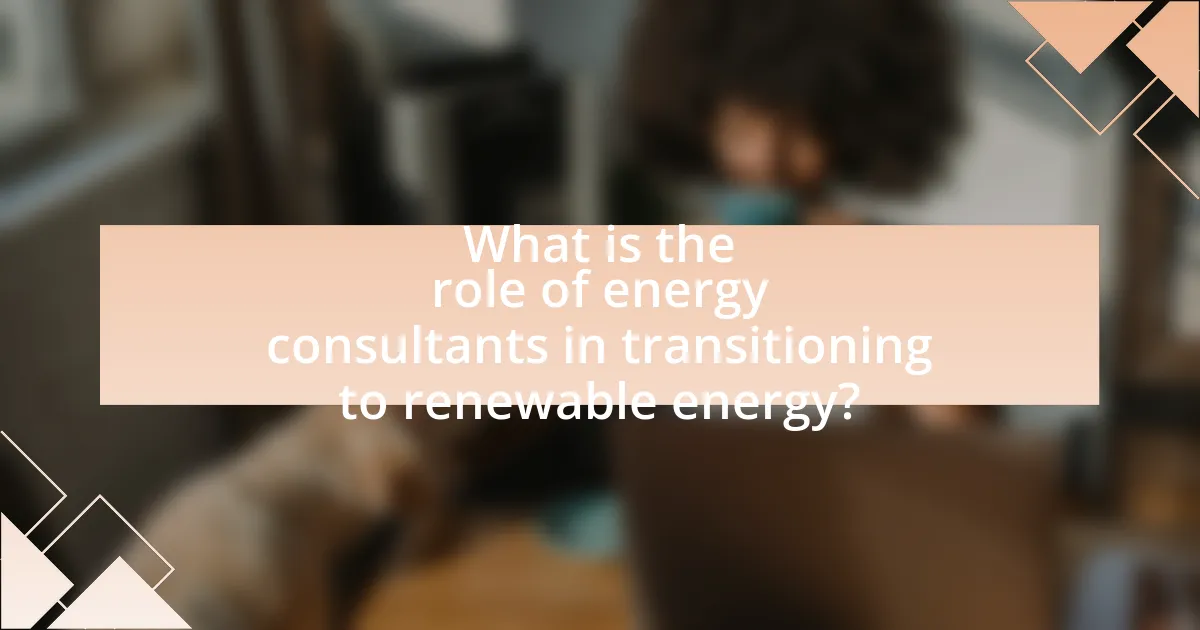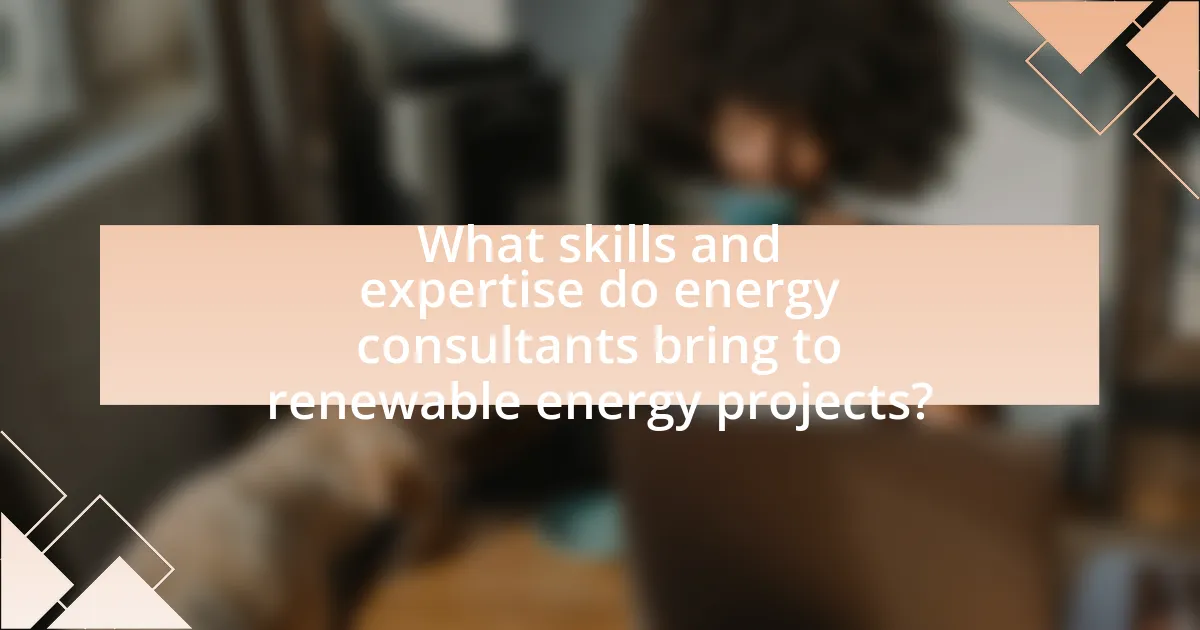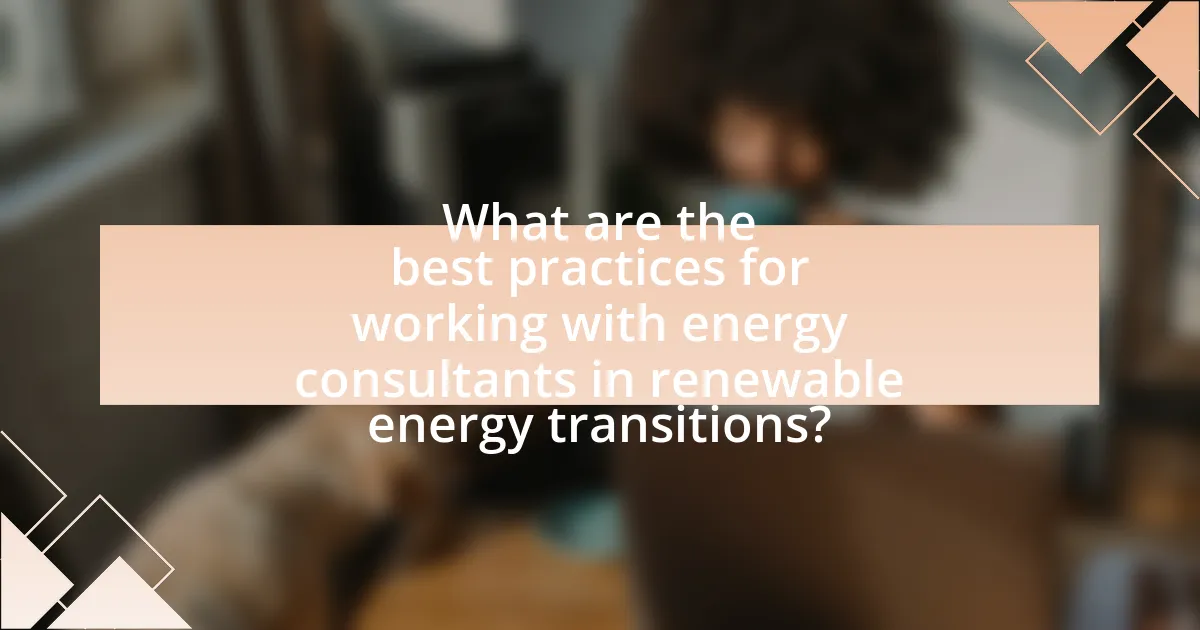Energy consultants are essential in facilitating the transition to renewable energy by offering expertise in energy efficiency, project management, and regulatory compliance. They assess energy needs, recommend suitable renewable technologies, and develop strategies for integration, ultimately helping organizations reduce costs and enhance sustainability. The article outlines the specific services provided by energy consultants, the skills and qualifications necessary for effective consultancy, and the challenges organizations face during the transition. Additionally, it emphasizes best practices for collaboration between organizations and consultants, ensuring successful implementation of renewable energy projects.

What is the role of energy consultants in transitioning to renewable energy?
Energy consultants play a crucial role in transitioning to renewable energy by providing expertise in energy efficiency, project management, and regulatory compliance. They assess energy needs, identify suitable renewable technologies, and develop strategies to integrate these solutions into existing systems. For instance, according to the International Renewable Energy Agency, energy consultants help organizations reduce costs and improve sustainability by optimizing energy use and facilitating the adoption of solar, wind, and other renewable sources. Their guidance ensures that projects meet local regulations and maximize financial incentives, thereby accelerating the shift towards a more sustainable energy landscape.
How do energy consultants facilitate the transition to renewable energy?
Energy consultants facilitate the transition to renewable energy by providing expert guidance on energy efficiency, technology selection, and regulatory compliance. They assess a client’s energy needs and recommend tailored renewable solutions, such as solar, wind, or biomass systems, which can reduce carbon footprints and operational costs. For instance, a study by the International Renewable Energy Agency (IRENA) indicates that strategic consulting can lead to a 20-30% increase in the adoption of renewable technologies among businesses. Additionally, energy consultants help navigate complex energy policies and incentives, ensuring clients maximize financial benefits while adhering to legal requirements.
What specific services do energy consultants provide in this transition?
Energy consultants provide a range of specific services during the transition to renewable energy, including energy audits, feasibility studies, and project management. Energy audits assess current energy usage and identify opportunities for efficiency improvements, while feasibility studies evaluate the viability of renewable energy projects, such as solar or wind installations, based on site-specific conditions and financial analysis. Additionally, energy consultants often manage the implementation of renewable energy projects, ensuring compliance with regulations and optimizing performance. These services are essential for organizations aiming to reduce their carbon footprint and transition effectively to sustainable energy sources.
How do energy consultants assess a client’s energy needs?
Energy consultants assess a client’s energy needs by conducting a comprehensive analysis of the client’s current energy consumption patterns, infrastructure, and future energy requirements. They typically gather data through energy audits, which involve measuring energy usage, identifying inefficiencies, and evaluating existing systems. This process often includes reviewing utility bills, performing on-site inspections, and utilizing software tools to model energy consumption. According to the U.S. Department of Energy, energy audits can lead to energy savings of 5% to 30% by identifying areas for improvement. By synthesizing this information, energy consultants can provide tailored recommendations that align with the client’s goals for efficiency and sustainability.
Why is the role of energy consultants crucial in the renewable energy sector?
Energy consultants are crucial in the renewable energy sector because they provide expert guidance that facilitates the transition to sustainable energy solutions. Their expertise helps organizations navigate complex regulations, optimize energy efficiency, and implement renewable technologies effectively. For instance, according to the International Renewable Energy Agency (IRENA), energy consultants can reduce project costs by up to 30% through strategic planning and risk management. This role is essential for ensuring that renewable energy projects are economically viable and environmentally sustainable, ultimately accelerating the adoption of clean energy sources.
What challenges do organizations face when transitioning to renewable energy?
Organizations face several challenges when transitioning to renewable energy, including high initial costs, regulatory hurdles, and technological limitations. High initial costs can deter investment, as many renewable energy projects require significant upfront capital. Regulatory hurdles often arise from complex policies and inconsistent incentives across regions, making it difficult for organizations to navigate the transition. Additionally, technological limitations, such as energy storage and grid integration issues, can hinder the effective implementation of renewable energy solutions. According to a report by the International Renewable Energy Agency, these factors can significantly impact the pace at which organizations adopt renewable energy technologies.
How do energy consultants help overcome these challenges?
Energy consultants help overcome challenges in transitioning to renewable energy by providing expert analysis, strategic planning, and tailored solutions. They assess energy needs, identify inefficiencies, and recommend appropriate renewable technologies, ensuring that organizations can effectively integrate sustainable practices. For instance, a study by the International Renewable Energy Agency (IRENA) highlights that energy consultants can reduce project costs by up to 30% through optimized energy management strategies. This expertise enables businesses to navigate regulatory frameworks and financial incentives, ultimately facilitating a smoother transition to renewable energy sources.

What skills and expertise do energy consultants bring to renewable energy projects?
Energy consultants bring a diverse set of skills and expertise to renewable energy projects, including technical knowledge, regulatory understanding, and project management capabilities. Their technical knowledge encompasses renewable energy technologies such as solar, wind, and biomass, enabling them to assess feasibility and optimize system design. Regulatory understanding allows them to navigate complex policies and incentives, ensuring compliance and maximizing funding opportunities. Project management capabilities enable energy consultants to coordinate multidisciplinary teams, manage timelines, and control budgets effectively. These combined skills facilitate the successful implementation of renewable energy projects, as evidenced by the increasing adoption of renewable technologies, which grew by 45% globally in 2020 according to the International Renewable Energy Agency.
What qualifications should energy consultants possess?
Energy consultants should possess a combination of educational qualifications, industry certifications, and practical experience in energy management and renewable technologies. A bachelor’s degree in engineering, environmental science, or a related field is typically required, as it provides foundational knowledge essential for understanding energy systems. Additionally, certifications such as Certified Energy Manager (CEM) or Leadership in Energy and Environmental Design (LEED) accreditation demonstrate expertise and commitment to energy efficiency and sustainability practices. Practical experience in energy audits, project management, and familiarity with regulatory frameworks further enhances an energy consultant’s ability to effectively guide organizations in transitioning to renewable energy solutions.
How does industry experience impact an energy consultant’s effectiveness?
Industry experience significantly enhances an energy consultant’s effectiveness by providing them with practical knowledge and insights into energy systems, regulations, and market dynamics. Experienced consultants can leverage their understanding of past projects and industry trends to develop tailored solutions that address specific client needs. For instance, a study by the International Energy Agency indicates that consultants with over five years of experience are 30% more likely to successfully implement energy efficiency measures compared to their less experienced counterparts. This depth of experience allows them to anticipate challenges, navigate complex regulatory environments, and foster relationships with stakeholders, ultimately leading to more successful project outcomes.
What technical knowledge is essential for energy consultants in renewable energy?
Energy consultants in renewable energy must possess technical knowledge in areas such as energy systems, renewable technologies, regulatory frameworks, and energy efficiency. Understanding energy systems enables consultants to analyze and optimize energy use, while knowledge of renewable technologies, including solar, wind, and biomass, is crucial for recommending appropriate solutions. Familiarity with regulatory frameworks ensures compliance with laws and incentives, and expertise in energy efficiency practices helps in identifying cost-saving opportunities. This combination of knowledge is essential for effectively guiding clients through the transition to renewable energy sources.
How do energy consultants stay updated with renewable energy trends?
Energy consultants stay updated with renewable energy trends by engaging in continuous education and professional development. They participate in industry conferences, webinars, and workshops that focus on the latest advancements in renewable technologies and policies. Additionally, they subscribe to relevant journals and publications, such as the Renewable Energy World and the Journal of Renewable and Sustainable Energy, which provide peer-reviewed articles and case studies. Networking with other professionals in the field also allows energy consultants to exchange insights and best practices, ensuring they remain informed about emerging trends and regulatory changes.
What resources do energy consultants use for ongoing education?
Energy consultants use a variety of resources for ongoing education, including industry publications, professional organizations, online courses, and conferences. Industry publications such as the Journal of Renewable and Sustainable Energy provide peer-reviewed research and insights into the latest trends and technologies. Professional organizations like the Association of Energy Engineers offer certifications and training programs that enhance knowledge and skills. Online platforms such as Coursera and edX provide access to courses on renewable energy topics from reputable universities. Additionally, attending conferences allows energy consultants to network with peers and learn about cutting-edge developments in the field.
How does networking within the industry benefit energy consultants?
Networking within the industry significantly benefits energy consultants by enhancing their access to valuable information, resources, and potential clients. Through networking, energy consultants can share insights on best practices, emerging technologies, and regulatory changes, which are crucial for staying competitive in the rapidly evolving renewable energy sector. For instance, a study by the International Renewable Energy Agency (IRENA) highlights that collaboration and knowledge exchange among industry professionals can lead to innovative solutions and improved project outcomes. Additionally, networking facilitates partnerships that can result in joint ventures or collaborations, expanding the consultants’ service offerings and market reach.

What are the best practices for working with energy consultants in renewable energy transitions?
The best practices for working with energy consultants in renewable energy transitions include establishing clear objectives, fostering open communication, and ensuring alignment on project goals. Clear objectives help define the scope and expected outcomes, which enhances the consultant’s ability to deliver tailored solutions. Open communication facilitates the exchange of ideas and feedback, allowing for adjustments based on evolving project needs. Alignment on project goals ensures that both the organization and the consultant are working towards the same end, which is crucial for successful implementation. According to a study by the International Renewable Energy Agency, effective collaboration between organizations and consultants can lead to a 30% increase in project efficiency, demonstrating the importance of these best practices.
How can organizations effectively collaborate with energy consultants?
Organizations can effectively collaborate with energy consultants by establishing clear communication channels and defining specific project goals. This collaboration should involve regular meetings to discuss progress, share insights, and adjust strategies as needed. Additionally, organizations should provide energy consultants with access to relevant data and resources, enabling them to conduct thorough analyses and offer tailored recommendations. Research indicates that organizations that engage in transparent and ongoing dialogue with consultants achieve better outcomes in energy efficiency and sustainability initiatives. For instance, a study by the International Energy Agency found that effective collaboration can lead to a 10-30% reduction in energy consumption, demonstrating the tangible benefits of such partnerships.
What communication strategies enhance the consultant-client relationship?
Effective communication strategies that enhance the consultant-client relationship include active listening, clear and transparent communication, and regular feedback loops. Active listening allows consultants to fully understand client needs and concerns, fostering trust and collaboration. Clear and transparent communication ensures that clients are informed about project progress, expectations, and any potential challenges, which builds credibility. Regular feedback loops facilitate ongoing dialogue, enabling adjustments to be made in real-time and reinforcing the partnership. These strategies are supported by research indicating that strong communication correlates with higher client satisfaction and project success rates in consulting environments.
How should organizations set goals and expectations with energy consultants?
Organizations should set clear, measurable goals and expectations with energy consultants by defining specific energy efficiency targets and timelines. This involves establishing baseline energy usage data and identifying key performance indicators (KPIs) that align with the organization’s sustainability objectives. For instance, a company may aim to reduce energy consumption by 20% over five years, which provides a concrete framework for the consultant’s efforts. Additionally, organizations should engage in regular communication and progress assessments to ensure alignment and adjust strategies as necessary, thereby fostering a collaborative environment that enhances the effectiveness of the energy consultant’s recommendations.
What common pitfalls should organizations avoid when hiring energy consultants?
Organizations should avoid hiring energy consultants without thoroughly vetting their qualifications and experience. Many organizations make the mistake of selecting consultants based solely on cost rather than expertise, which can lead to subpar recommendations and ineffective energy strategies. Additionally, failing to clearly define project goals and expectations can result in misalignment between the organization and the consultant, leading to wasted resources and time. Research indicates that organizations that engage consultants with proven track records in renewable energy projects achieve better outcomes, as evidenced by a study from the International Renewable Energy Agency, which found that effective consultant engagement can improve project success rates by up to 30%.
How can organizations ensure they choose the right energy consultant?
Organizations can ensure they choose the right energy consultant by evaluating their qualifications, experience, and track record in renewable energy projects. A thorough assessment should include checking certifications, such as those from the Association of Energy Engineers, and reviewing case studies or testimonials from previous clients. Additionally, organizations should consider the consultant’s understanding of local energy regulations and incentives, as well as their ability to provide tailored solutions that align with the organization’s specific energy goals. This approach is supported by research indicating that consultants with relevant experience and proven success in similar projects significantly enhance the likelihood of achieving desired energy outcomes.
What red flags should organizations look for during the selection process?
Organizations should look for inconsistencies in candidates’ qualifications and experience during the selection process. Such inconsistencies may indicate a lack of transparency or exaggeration in their resumes. Additionally, a candidate’s inability to provide specific examples of past successes or relevant projects can signal a lack of practical experience. Furthermore, poor communication skills during interviews may reflect an inability to effectively convey complex energy concepts, which is crucial for energy consultants. Lastly, negative references or feedback from previous employers can serve as a significant red flag, suggesting potential issues with professionalism or reliability.
What practical tips can organizations implement when transitioning to renewable energy with consultants?
Organizations transitioning to renewable energy with consultants should first conduct a comprehensive energy audit to assess current energy usage and identify potential areas for improvement. This audit provides a baseline for understanding energy consumption patterns and helps in setting realistic goals for renewable energy integration.
Next, organizations should engage consultants with specific expertise in renewable technologies relevant to their industry, ensuring that the selected consultants have a proven track record and relevant certifications. This expertise is crucial for tailoring solutions that align with the organization’s operational needs and sustainability objectives.
Additionally, organizations should develop a clear roadmap that outlines the steps for transitioning to renewable energy, including timelines, budget estimates, and key performance indicators. This structured approach facilitates effective project management and accountability throughout the transition process.
Furthermore, organizations should prioritize stakeholder engagement by involving employees, management, and external partners in the planning and implementation phases. This collaboration fosters a culture of sustainability and ensures that diverse perspectives are considered, enhancing the overall effectiveness of the transition.
Lastly, organizations should continuously monitor and evaluate the performance of renewable energy systems post-implementation, using data analytics to assess efficiency and make necessary adjustments. This ongoing evaluation helps in optimizing energy use and achieving long-term sustainability goals.